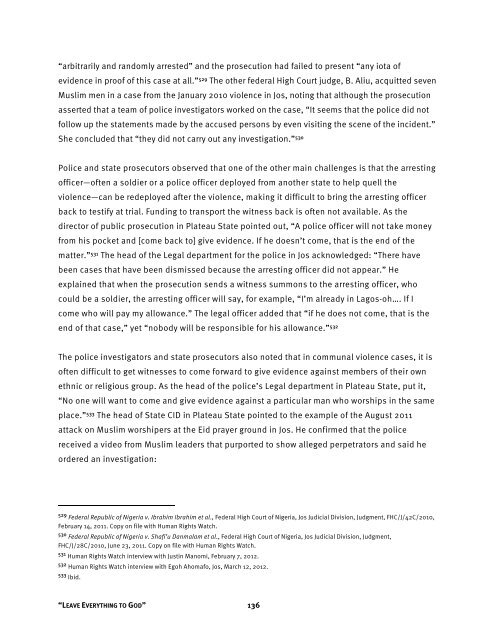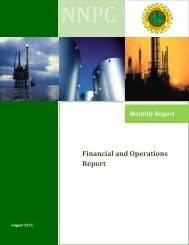You also want an ePaper? Increase the reach of your titles
YUMPU automatically turns print PDFs into web optimized ePapers that Google loves.
“arbitrarily and randomly arrested” and the prosecution had failed to present “any iota of<br />
evidence in proof of this case at all.” 529 The other federal High Court judge, B. Aliu, acquitted seven<br />
Muslim men in a case from the January 2010 violence in Jos, noting that although the prosecution<br />
asserted that a team of police investigators worked on the case, “It seems that the police did not<br />
follow up the statements made by the accused persons by even visiting the scene of the incident.”<br />
She concluded that “they did not carry out any investigation.” 530<br />
Police and state prosecutors observed that one of the other main challenges is that the arresting<br />
officer—often a soldier or a police officer deployed from another state to help quell the<br />
violence—can be redeployed after the violence, making it difficult to bring the arresting officer<br />
back to testify at trial. Funding to transport the witness back is often not available. As the<br />
director of public prosecution in Plateau State pointed out, “A police officer will not take money<br />
from his pocket and [come back to] give evidence. If he doesn’t come, that is the end of the<br />
matter.” 531 The head of the Legal department for the police in Jos acknowledged: “There have<br />
been cases that have been dismissed because the arresting officer did not appear.” He<br />
explained that when the prosecution sends a witness summons to the arresting officer, who<br />
could be a soldier, the arresting officer will say, for example, “I’m already in Lagos-oh…. If I<br />
come who will pay my allowance.” The legal officer added that “if he does not come, that is the<br />
end of that case,” yet “nobody will be responsible for his allowance.” 532<br />
The police investigators and state prosecutors also noted that in communal violence cases, it is<br />
often difficult to get witnesses to come forward to give evidence against members of their own<br />
ethnic or religious group. As the head of the police’s Legal department in Plateau State, put it,<br />
“No one will want to come and give evidence against a particular man who worships in the same<br />
place.” 533 The head of State CID in Plateau State pointed to the example of the August 2011<br />
attack on Muslim worshipers at the Eid prayer ground in Jos. He confirmed that the police<br />
received a video from Muslim leaders that purported to show alleged perpetrators and said he<br />
ordered an investigation:<br />
529 Federal Republic of Nigeria v. Ibrahim Ibrahim et al., Federal High Court of Nigeria, Jos Judicial Division, Judgment, FHC/J/42C/2010,<br />
February 14, 2011. Copy on file with Human Rights Watch.<br />
530 Federal Republic of Nigeria v. Shafi’u Danmalam et al., Federal High Court of Nigeria, Jos Judicial Division, Judgment,<br />
FHC/J/28C/2010, June 23, 2011. Copy on file with Human Rights Watch.<br />
531 Human Rights Watch interview with Justin Manomi, February 7, 2012.<br />
532 Human Rights Watch interview with Egoh Ahomafo, Jos, March 12, 2012.<br />
533 Ibid.<br />
“LEAVE EVERYTHING TO GOD” 136




